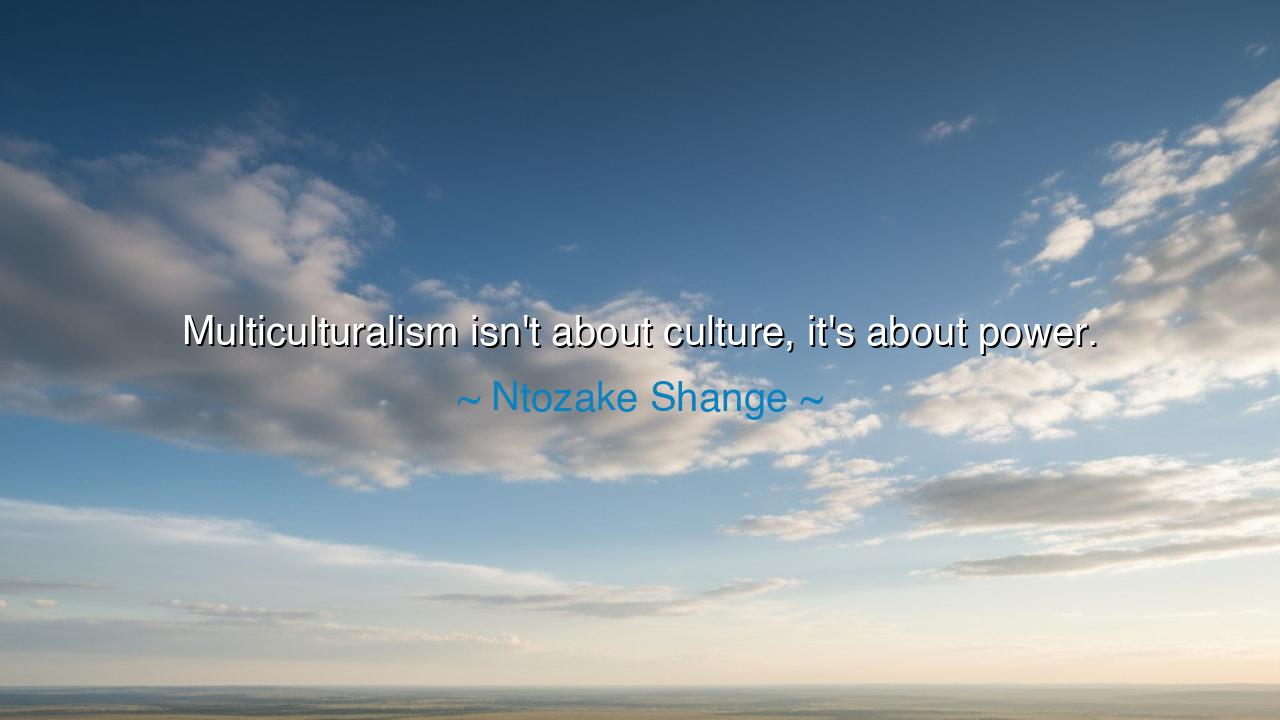
Multiculturalism isn't about culture, it's about power.






The words of Ntozake Shange—“Multiculturalism isn't about culture, it's about power.”—are as a sword cutting through illusion. Many believe that multiculturalism is merely the mingling of foods, songs, and festivals, a tapestry of colors placed side by side. Yet Shange unmasks the deeper truth: beneath the surface of celebration lies a struggle for power—the authority to define, to include, to exclude, and to shape the narrative of whose voices are honored and whose are silenced.
This utterance is a reminder that culture is never neutral. To place cultures side by side is not simply to honor them, but to decide how they are arranged, who stands at the center, and who remains at the margins. Thus, power governs the stage, determining which traditions are embraced and which are dismissed as foreign or unworthy. Shange calls us to see beyond appearances, to recognize that what is often painted as harmony may conceal an imbalance of dominance and submission.
History gives witness in the tale of colonial empires. When the British ruled India, they spoke often of bringing cultures together, of exchange and “civilization.” Yet what was truly at play was power: one culture standing above, claiming the right to define the worth of another. Even the blending of traditions—language, education, law—was not pure sharing, but the shaping of society by those who held the reins. So too, Shange warns, modern claims of multiculturalism may disguise the same contests for control.
Her words also shine a light upon the responsibility of awareness. To live in a diverse world is not merely to enjoy difference, but to acknowledge the power structures that shape how difference is perceived. True respect requires vigilance: to ensure that no culture is tokenized, no voice drowned, no people diminished under the guise of inclusion. Only when power is shared, and not hoarded, can multiculturalism be more than appearance—it can be justice.
Thus, let her wisdom be carried forward: celebrate not only the colors and sounds of many peoples, but guard against the hidden chains that bind them. For multiculturalism without justice is performance, but multiculturalism with equity is liberation. And remember always, that in the realm of human affairs, it is not enough to honor culture; one must also confront the forces of power that govern its place in the world.






NHnhung hi
This quote flips the entire discussion of multiculturalism on its head. It’s not a rejection of diversity, but a call to examine its structure. If multiculturalism is about power, then every act of representation is political—who gets invited to the table, who gets silenced, and who gets to lead the conversation. It’s a sharp reminder that equality isn’t just about presence, but participation.
HDHuy Duong
There’s a deep truth here that people often avoid discussing. Celebrating culture sounds positive, but when power dynamics remain unchanged, it can become performative. I can’t help but think about how corporations or governments use the language of multiculturalism to appear progressive while maintaining control. Maybe the question isn’t whether we’re diverse, but who gets to define what that diversity means.
MDVu Manh Dung
I think this line exposes the tension between visibility and control. Being part of a multicultural society doesn’t necessarily mean all voices are equally heard—it depends on who decides which cultures are highlighted and which are ignored. It makes me reflect on how often ‘diversity’ is curated for comfort rather than justice. Maybe real inclusion starts with ceding power, not just sharing space.
NVBinh Nguyen van
This feels like a powerful critique of modern liberal ideals. By saying multiculturalism is about power, Shange forces us to confront the uncomfortable truth that inclusion often operates within unequal systems. Even when cultures are recognized, they’re not always respected equally. It raises a big question: can true multiculturalism exist in a society built on imbalance and privilege?
TTThanh Tran
I find this quote unsettling but incredibly thought-provoking. It implies that multiculturalism can be used as a façade—something that appears inclusive while maintaining existing hierarchies. It makes me wonder whether diversity efforts in politics or media actually empower marginalized voices, or if they just give an illusion of progress without redistributing real influence or opportunity.